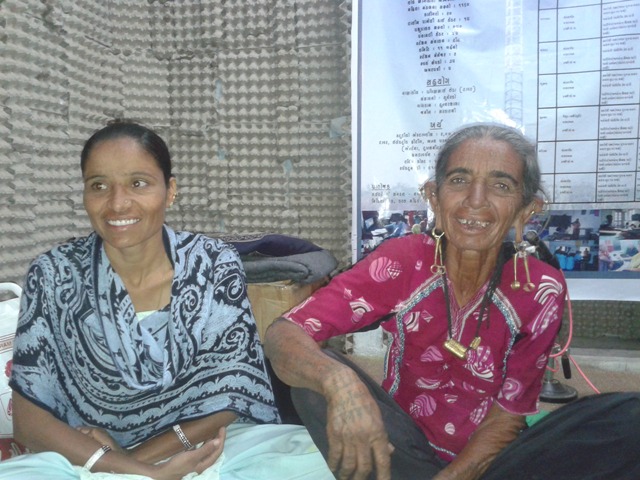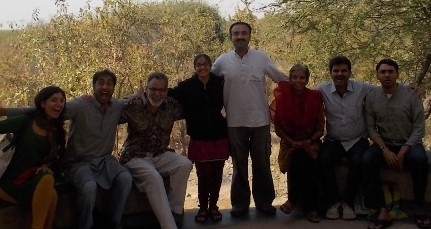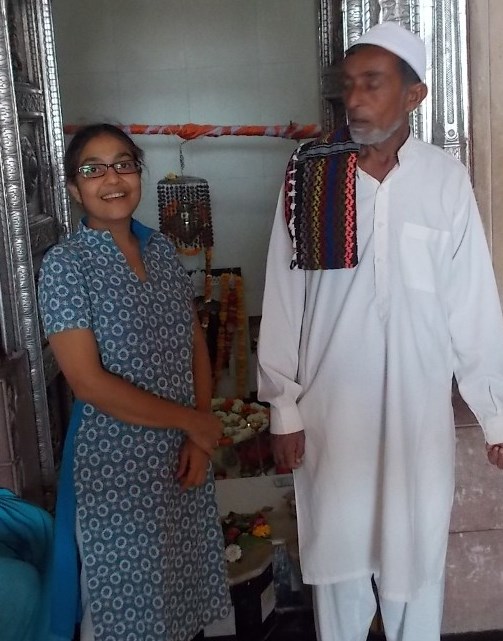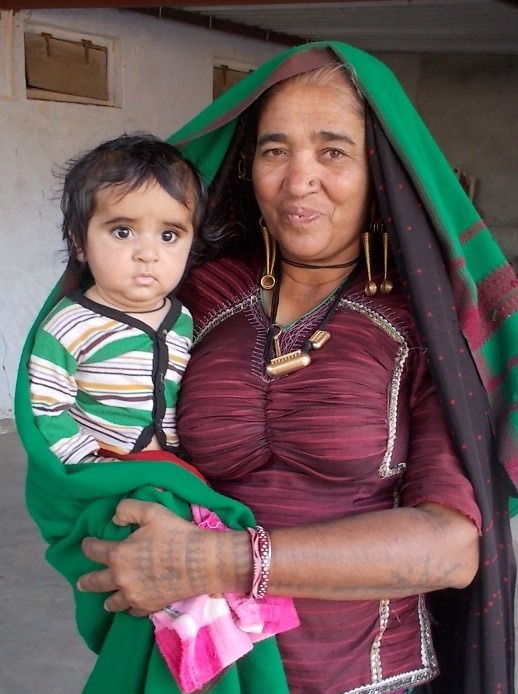The day of yaatra started with prayers by my parents and a bag full of goodies that they had to give to ensure that their child is taken care of! To start with I had a bad throat and was feeling a little physical fatigue. In my mind I thought God is checking if I am really serious about this yatra! Well, we reached Bhuj and were welcomed at Khamir a crafts village were artisans are trying to preserve 1000 year old art forms of pottery, various kinds of hand weaving, dyeing of handloom fabrics.
Our hosts Sushmaben and Sandeepbhai were ready to receive us and we had a hearty evening with all our Moved by love friends also joining us. We were amazed to meet Reshma who had come from Baroda with dinner for all of us from Mumbai, just so that we can spend the evening in meaningful conversations, meditate and just be ourselves. Her entire family had helped her cook without even knowing who they are feeding! This gesture was really an act of invisible service. As it was Sandeepbhai’s bday we thought of feeding dogs on the street and so Neerad went out to get some biscuits and to our surprise he came with a story! While he was searching for biscuits he landed up in a small shop whose owner makes around 50Kgs of bread everyday to feed stray dogs, he has been doing this for past 15 years, every single day and out of his pocket only! He was an NGO of love and service just by himself. He keeps the rotis ready by evening and whoever wants to then feed dogs can just go and collect as many as they need.
With all this a-ha moments of the day and a lot of food that Sushmaben lovingly offered me every and everyone in the group praying for me I slept and got completely healed next morning.
Day 2 – Heading for Lakhpat
We reached Lakhpat via Ashapura temple. Lakhpat is the last village on border of India Pakistan Kori creek. It’s a village with about a total population of 400 people. This place holds a great historic value as it was a port that supported international business in the 17th century and the great Alexander frequented India thru this very port. Now the ruins are standing as proof of this history. But we came across some other intriguing facts that are rooted in global oneness. Here was the place where a sufi saint named Ghosh Mohammad lived, who was a devotee of lord Krishna and has written poems in local dialect praising the Lord and praying Him to come. It is also said that he considered the great saint Mirabai as his sister and both of them met and sang Krishna bhajans! We were amazed to learn this and as we were mulling about secularism in those ages we came across a Gurudwara where Guru Govind Singh stayed twice on his way to Mecca for a pilgrimage! Needless to mention we parked at the Gurudwara to absorb and learn more. We lavishly soaked ourselves in whatever good conversation we could do with the wise people at the place. We met an old gentleman who only eats out of a bowl. He truly practices a renunciation of taste. We saw that when sweets were offered to him he took it in the same bowl with some leftover yoghurt and ate it! This old man wakes up at 4am and starts chanting that goes on throughout all his waking hours He would hardly engage in any worldly conversation and he keeps himself busy in serving the space by working in the kitchen, garden, cleaning, feeding birds and animals and many other invisible chores. We met a young priest who explained the meaning of “aadami” or ‘human being’ to us..he says “aa’’ is life force and “dami’’ is sack of mud. So only if we have the vigour of life force we are alive otherwise we are dummies, of no use. Further he explained till we attain the real knowledge of oneness we are Anpadh (illiterate). Knowledge itself is being one with God. We should work on becoming like the wind as it is the most closest to God. We are aware of its presence, it provides life to all yet it is unseen and everywhere. Whereas we are solidified with all the 5 elements, so until we liquefy ourselves and finally become wind we have to do constantly cultivate good practices.
Day 3- Shirin, Sonal and Notiyaar family
We meet a humble man in his late fifties named Osmanbhai Notiyaar. He stays at Lakhpat and we visited his home and his family. Behind his humble outlook is a man who is a saint at heart. He recites verses and small poems from sufi saints of his land and says the real life is in giving food to the hungry and showing path to the one who is lost. We spent a whole day with that family and took him and his daughter out for a little picnic. His daughter has never visited Narayan sarovar a place that is known as the birthplace of all of humanity when Lord Brahma created the first human. One more time we experienced a sense of deep oneness when this Muslim walks with us into a Shiva temple chats with the pujari and prays with us! We also met a girl at the temple office who is a journalist who shares stories of courage by girls in her village and keenly works on development around that place in a real sense. In the evening we had a small women’s meeting with a couple of neighbours trailing in and we spoke of issues of women in a small village to what do they feel about religion and their ideas on work. To my surprise the women who didn’t know how to operate a modern day stove with cylinder had brilliant global outlook on these topics. They strongly believed in community living and sharing resources as that is the way people will learn from each other and grow. As we were leaving Shirin asks Can we make you something for your onward trip? And her mother immediately offers me some options of what she can make before we leave. I humbly refused and telepathized with my mother…look your child is being taken care of.
Day-4- Hajipir, bhuj family, kharadia village (rabari community)
We left for Hajipir in the morning and it was a difficult drive as the stretch of 30kms was a dirt road and lot of vehicular traffic. We were also short of fuel and we found out that there are no petrol pumps on the roads to villages except the one connected with city. Somehow with God’s grace we reached the place and are blessed to know that local shopkeeper sells petrol in 1ltr. Bottles! We were hungry and tired due to the drive and there was no place that would offer food. In that moment of distress, we meet a group of 4 aged folks in their 70’s who had come for visiting the mosque. They offered us food! We shared a meal with them and a bond is built as we understand that one of the lady’s father was the Diwan of Bhuj (royal king’s first advisor) . They shared their experiences of Vipassana and we smiled at ourselves and thanked all noble friends whose wishes helped us meet this group. From here we head out to another small village called Kharadia. This village had a rabari community – engaged mainly in rearing cattle and selling milk. Earlier they were a nomadic tribe that has now settled. We were lovingly hosted by “Meghuben” a lady in her early fifties who runs a local self help group. She is engaged in development work in the area and leads about 40 women. Together they create beautiful art pieces of handwork. This community provides a testimony of hardwork, simple living and overall development. Here women are uneducated and men only go upto matriculation but their understanding of life is way beyond what books can teach. They live in harmony and co-ordination with the whole environment around them. Looking at the life of these women a question arose in my mind…we claim to do so much..yet we waste so much of our daily time and are unhappy and this woman works the whole day, has no knowledge of technology, she is engaged in empowering other around her and she sleeps with a smile on her face every single day! Who is more learned?

Day 5 – Radio station Bhimsar
On our way to Nakhatrana we come across a small village Bhimsar the population is barely 200 ppl. But it has a radio station! Talk about entrepreneurial spirit. We walk into the radio station to find out that this is run by 2 local women – Sitaben and Sharifa who again are engaged in supporting a lot of women and this radio station is for them. They run it 6 hrs. a day starting with prabhatiya (devotional songs), community programs, educational programs, interviews and local folk music. These women interview me and I interview them. I ask them if they want to give any message to us (women in cities), to which she says you are all educated and smart do something for women around you. I am moved by the feeling of this friend for all. They deeply care about all women around them and want to connect with as many as they can. We in cities create separate walls and not even connect with our neighbour. The question again pops up…who is more learned?


.JPG)

